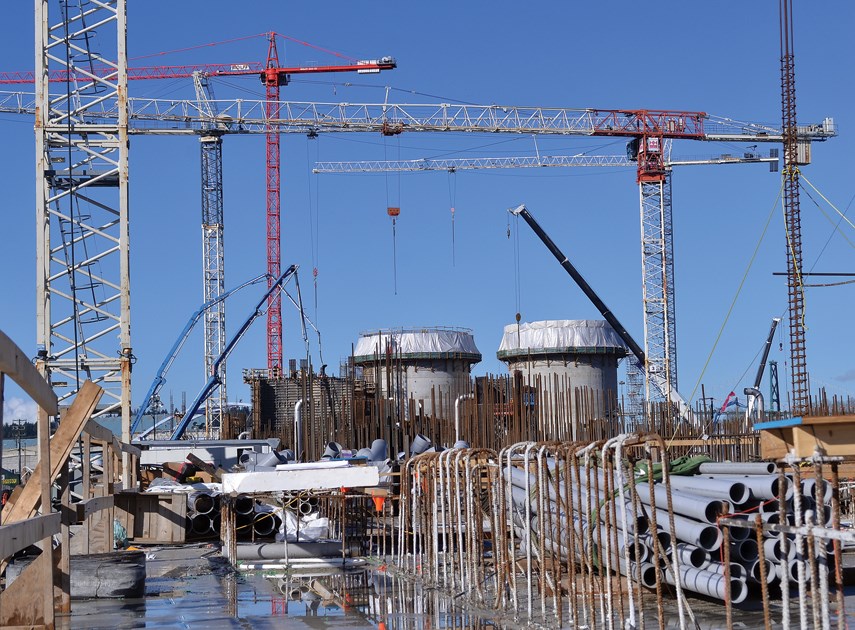Many months have passed since North Shore community leaders were told last September of the shocking budget growth of the wastewater treatment plant.
An original contract in 2017 of $554 million grew and grew and grew to today’s – but maybe not tomorrow’s – $3.86 billion.
Yet neither the North Shore’s leaders nor those elsewhere in the Lower Mainland can yet agree on a formula to pay for the ever-ascendant costs. With the 2025 Metro Vancouver budget deadline nearly upon us, it’s time to determine how to divvy the burden.
But the size of the sum has rendered the Metro Vancouver board paralyzed at times, frenzied at others, in arguing whether and how property owners in the three North Shore municipalities or across the federation’s nearly two dozen jurisdictions ought to pay. A cost apportionment bylaw has to be amended because of the ridiculous overrun here, but probably sets the stage for future project financing (like the Iona Island $10-ish billion plant upgrade), so politicians are trying to protect their constituents.
What’s clear is that last week’s Metro Vancouver meeting wasn’t the product of backroom deal-making, because discussions were awfully raw for an issue that after all these months should be cooked. The clearest decision appears to involve kicking the can down the road for a year to avert an imminent jolt to property owners. We will find out May 31 if that’s the best the group can muster.
As it stands, North Shore property owners would pay an average of $725 annually (some lower, some much higher) for 30 years and Lower Mainland property owners would pay an average of between $70 and $140, depending on where they live, for 15 years.
(If you’re wondering why a 30-year payment plan in one place and 15-year in the other, it’s because North Shore mayors a few years ago argued that a 15-year plan is foolish when the projects are designed for 30-year lifespans, so they were given a different payment plan than the rest of the region.)
There is some wishful, perhaps magical thinking involved in the punting of the problem – that a benefactor will emerge in the provincial election campaign to partly pay for the project. Neither the BC NDP government, nor the official opposition BC United, nor the ascendant BC Conservatives have so far raised their hands. The federal government is clear: don’t call on us, there are countless other infrastructure needs looming and lingering elsewhere, and if you pay for one you are on the hook for the others.
This fuzzy thinking, though, has pervaded Metro Vancouver for as long as any of us can remember. It’s an under-governed side hustle for mayors and councillors, and it’s administered without the necessary oversight to provide professional project management, transparency and long-term planning.
For instance, many infrastructure projects have an independent third-party oversight framework, established and financed at the outset. In this case, it wouldn’t replace Metro Vancouver but provide proactive input and periodic assessments to the board. There is usually, as we’ve seen here, an “optimism bias” that encroaches with every project; the oversight body is there to keep that realistic.
It creates a “three lines of defence” model: management with the responsibility to deliver; an internal “assurance team” to pay particular attention to the riskier areas of the expenditures, to provide objective intervention, and to advise this independent body to main the integrity of the project; and the third-party team to systematically evaluate the governance, processes and controls.
If that sounds like it’s into the weeds, well, when you’re dealing with billions of dollars you can’t just live at the surface level. Which is what Metro Vancouver has often done, taking a short-term view when there are obvious long-term needs.
I was astounded to learn that, after all this time, it has no capital plan beyond five years. Only after it’s been provoked into creating one has it committed to produce a 20-year plan by December.
“Considering the number and size of their assets, it’s completely incomprehensible to me that they are just now getting to it,” a veteran municipal leader told me.
Yes, indeed.
Kirk LaPointe is a West Vancouver columnist with an extensive background in journalism. His column on North Shore issues runs bi-weekly.




